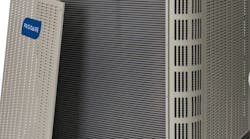Camp Shelby: Gateway to Iraq
Encompassing 134,820 acres, Camp Shelby Training Site is 12 miles south of Hattiesburg, MS, in portions of Perry and Forrest counties. Established during World War I, it is the largest state-owned and -operated field training site in the United States and has served continuously since then as a training site for reserve and active components of the Army, Navy, Marine Corps and Air Force. Following the deployment of troops to Iraq in March 2003, Camp Shelby was designated one of two independent mobilization stations for the U.S. Army Forces Command.
Clouds of War: A Distributor's Basic Training
In Spring 2002, Alex Weddington, vice president, General Supply & Machine Co. Inc. (GS&M), Meridian, MS, took an urgent call from an old friend, David Henderson, architect and partner with Glenn Engineering in nearby Laurel, MS. Henderson was returning to the office from Camp Shelby, the nation's largest training camp for the National Guard. The clouds of war with Iraq were once again gathering on the horizon, and Henderson had a problem which he hoped Weddington could help solve.
Henderson's client, Col. Larry Joe Daughtry, was Camp Shelby's chief engineer and facility manager. Anticipating the onslaught of troops arriving at the base, Daughtry's base commander had ordered him to provide the best training environment, sleeping comfort and quality of life for the morale of the first wave of National Guard troops deploying to Iraq. Daughtry threw this gauntlet to Henderson.
The concrete barracks, built in the 1960s, had poor ventilation with pitched wood-frame roofs that offered no cooling or heating system whatsoever — only a large fan at one end for ventilation. It wasn't until the early 1980s that air ducts and propane heating systems were installed. Daughtry said it was impractical and far too expensive to try to modify the existing horizontal systems. It was now early April, and Henderson asked Weddington if he could find a solution before the hot summer arrived in Hattiesburg.
Since 1913: General Supply & Machine Co. Inc.
Alex Weddington's grandfather, Albert Benjamin Weddington, founded GS&M in Meridian, MS, in 1913. GS&M manufactured and distributed portable saw mills throughout Mississippi and west Alabama. A man of strong principles, Grandfather Weddington took great pride in never laying off one GS&M employee during the Depression. In his darkest days, he paid all wages out of his own pocket. During World War II, the U.S. government snapped up GS&M's portable saws to make wood pallets for shipping war materials and machines overseas. The company flourished and, at one time, employed 50 machinists.
Today, GS&M is a thriving wholesale distributor for HVAC, mill supplies, plumbing, pumps, valves and pipe fittings. In its third generation of Weddington management, Alex started working for his father, Hunter George Weddington, when he was only eight years old. Recently named U.S. Distributor of the Year by Mitsubishi Electric HVAC, GS&M has also been named regional Distributor of the Year numerous times by Tappan HVAC and American Standard.
Meeting Daughtry's Dilemma: How to Sell to the Military
Weddington told Henderson that he had an answer for Daughtry's dilemma. First introduced to Mitsubishi Electric HVAC products in the late 1990s, Weddington knew that Mitsubishi Electric HVAC's Mr. Slim® split-ductless systems were the perfect way to meet the base commander's demands for a comfortable environment for his soldiers. There was no reason to bend sheet metal and form expensive air ducts in each of the barracks. Weddington asked his friend to make an appointment the very next day.
To fully demonstrate the innovative inverter technology of Mr. Slim systems, Weddington showed Daughtry an actual MSZ 1:1 ratio heat pump system model delivering 9,000 Btu/h cooling and heating capacity with a then-remarkable 13-SEER rating. Daughtry could see the engineering logic and asked Weddington to install a typical 5,000-square-foot barracks with four 2-ton Mr. Slim systems as an experiment.
In the semitropical Hattiesburg area, it is common for the heat index to hit 115 degrees. The early summer of 2002 was no exception. When the Mr. Slim test units were fired up, the outdoor heat was more than 100 degrees. In less than one hour, the indoor temperature of the old barracks dramatically dropped to a cool, comfortable 68 degrees. Daughtry was impressed with the success and effectiveness of this first test, and he told Henderson and Weddington that he had found the answer he was searching for.
Fast-Forward Nine Months: 100 Barracks in 60 Days
The March 2003 U.S. mission to Iraq suddenly placed a new set of priorities before Camp Shelby's team of engineers. Building up the Army National Guard for deployment was now an urgent national priority, and this historic training camp was designated one of two mobilization stations for the U.S. Army Forces Command.
Henderson placed another urgent call to Weddington. Col. Daughtry had received urgent orders to design, order and install air-conditioning systems in 100 barracks by the end of May. It was now April 1, and National Guard troops from Indiana would be arriving on Memorial Day; there were 60 days to get the job done.
Impressed with the success and effectiveness of the previous year's trial, Daughtry asked Weddington to provide, overnight, 400 Mr. Slim indoor air handlers and outdoor units, and a contractor who could possibly accomplish the impossible. Weddington knew that with only 60 days to seal up 40-year-old systems and outfit 100 barracks with new comfort solutions, it was going to take a small miracle, but he knew that he could do it.
Weddington first verified with MEHVAC that they could provide the units needed. He then called another old friend with an amazing track record for producing miracles — Hattiesburg HVACR contractor George Curry Jr., president of Hub Mechanical Inc. Curry cleared his company's schedule and made his crews available. For a problematic installation of the indoor air handlers caused by the barracks' pitched roof, Daughtry designed a 4-foot-wide by 18-inch-deep prototype header to hang from the ceiling. Then, for the first 100 barracks, he had his staff detach and cap the natural gas lines, seal up the 25-year-old heating systems and disconnect the existing power lines and ventilation fans.
The Fast Track: Mission Impossible Accomplished
On May 1, 2003, Curry and three Hub Mechanical crews arrived to begin the fast-track installation. “After the first or second building, the Hub crews were able to establish an amazing rhythm,” Daughtry said. “Installing 20 systems [five barracks] each day, Curry and his guys made it possible for me to successfully achieve my commanding officer's challenging 60-day turnaround.”
The outdoor units sat on concrete pads supplied by GS&M. A three-inch hole punched into the side wall of each building allowed for refrigeration and power lines. Line-Hide™ systems made the pipes and lines invisible running into each facility. The indoor units were hung on the specially fabricated headers and the lines attached. By Memorial Day, the gigantic undertaking was finished, and, for the very first time in 40 years, the old barracks were cool, dry and comfortable.
“Mr. Slim split-ductless air conditioning and heat pumps were life-savers,” Daughtry said. “They are not only quiet and powerful but easy to install. We did not have to build expensive and time-consuming air ducts. I don't know of any other system that could have made this job achievable. Mr. Slim systems also helped us save a lot of money because the existing two-pole electrical service supplied to each building was adequate to run the units the Hub crews installed.”
Past Is Prologue: 200 Barracks in 60 Days
The base commander was extremely pleased with the success of the equipment and fast-track installation. Because two more battalions of soldiers were soon due to arrive from Kentucky, the 1st Army made a decision to move quickly and purchase the needed Mr. Slim systems for the next 200 barracks. It followed up with another fast-track method request: Provide 200 barracks that would be dry and comfortable for the troops in 60 days, by the end of July. Once again, Weddington and Curry stepped up to the plate and delivered.
Mike Smith is the senior marketing manager for Mitsubishi Electric HVAC, Suwanee, GA. Contact him at [email protected] or log onto www.mehvac.com.





